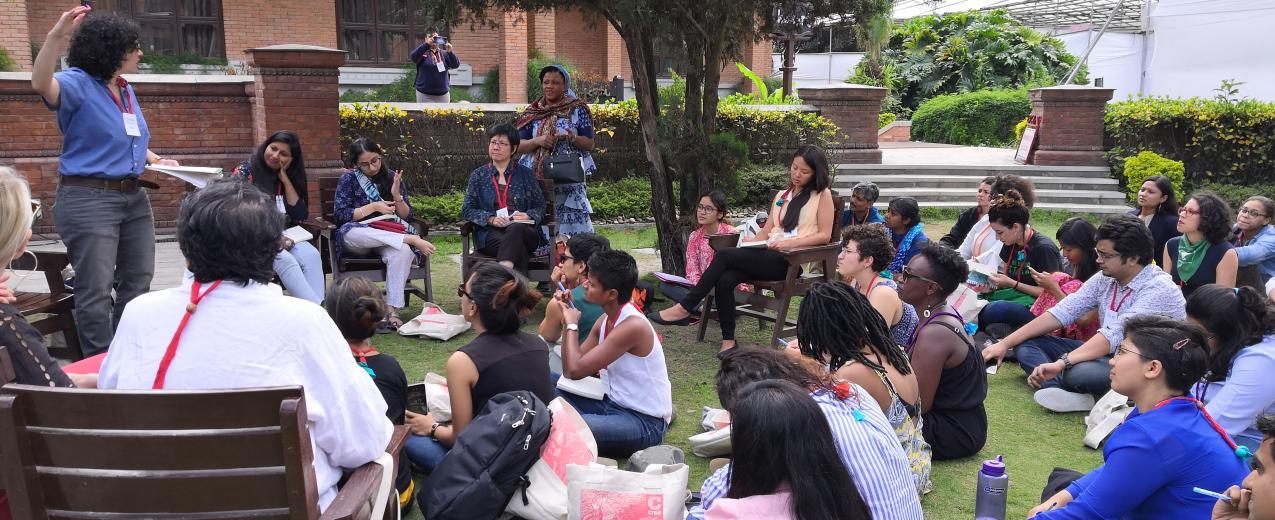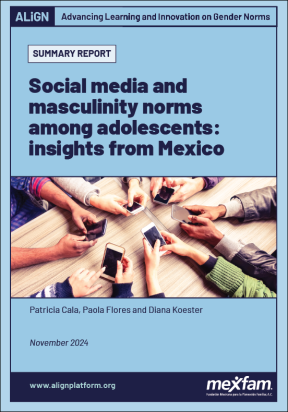
- Blog
- 14 Junio 2019
It was billed as a conference with a difference: and it most certainly was! This April, the Reconference organized by CREA in Kathmandu, Nepal, challenged the participants to re-think, re-boot and re-imagine the issues we deal with on a daily basis. I was lucky enough to be there with another colleague the International Center for Research on Women (ICRW) Asia office, with support from ALIGN. Long before we got there, we heard that the conference would break new ground and were warned that routine paper and power presentations would not be welcome.
Instead, we were expected to engage creatively in our own diverse styles, using different mediums and artistic expressions to question norms around issues of abortion, consent, disability, environmental justice, pleasure and danger, sex work, sexual and gender diversity, sports and technology.
And routine it was not! For me, the stand-out moments centred on sexual and gender diversity, sexual freedom and expression and the need to question and re-question the norms and boundaries that we set for ourselves and for others. Very often, discussions around sexual rights completely ignore the idea of pleasure and desire, and I was delighted that the conference reinforced the need to talk about these from the lens of agency and autonomy.
Panelists, artists and presenters spoke the language of gender diversity, stressing the need to break the emphasis on binaries and tackle the barriers this emphasis creates. They reminded us that this means challenging gender and social norms and rethinking how gender plays out in 'different bodies, in different people’s lives and in different situations'. It is critical to create safe spaces where people can freely explore and express these differences.

The Reconference urged us to re-think the ways in which policies and laws restrict and control women in sports. We heard personal stories from Indian athletes Dutee Chand and Pinki Pramanik who had to undergo humiliation in order to participate in women’s events in competitive sports because of their testosterone levels. We heard about the ongoing struggle of athlete Caster Semenya from South Africa, whose freedom to practice her sport is questioned relentlessly because of her gender identity. It is crucial to think about how gender norms influence and limit women’s participation in sports and how the rights of women athletes to bodily integrity and autonomy are constantly under threat.
I carry with me the story of Jayanthi Kuru-Utumpala, the first Sri Lankan to climb Mount Everest. She told us how the standard mountaineering gear – developed primarily for men – was unsuitable for her body and for women in general. She had to climb the world’s highest mountain in mountaineering clothes that did not fit her properly. That is just one illustration of how deep and all-pervasive gender-based discrimination is, and the many issues that must be addressed if it is to be overcome. Jayanthi’s narrative reminded us that women’s participation in sports and other physical activity is closely tied to their right to occupy a public space and to have fun. So, we must claim that space, proudly and fiercely!
At the conference, we presented our exploratory study on ‘Male Engagement in Premarital Abortion in New Delhi, India’. Our study findings were presented through an infographic on why it is important to bring men into the discourse on abortion. We stressed the need to understand the role that men play during a premarital abortion, the need to capture their vulnerabilities and challenges, and the importance of interaction between service providers, male partners and family members. Participants welcomed our findings on the need to capture male feelings and experiences. Here again the focus was on young peoples’ sexual agency and the provision of adequate information for their pleasure and safety.

The Reconference left us rejuvenated, with a motivation to use art and other creative tools and technologies to present our work around gender norms and gender equity. It also left us with many questions around our own biases, judgements, and the way in which we need to renegotiate the boundaries related to gender and sexuality within our minds, our bodies, our personal and professional lives and our public spaces.
About the author - Sapna Kedia

At ICRW she coordinates and conducts qualitative research primarily on health and reproductive rights of women. Sapna works on men and masculinities and has recently led the study on ‘Male Involvement in Pre-Marital Abortions in Delhi’. She also supports the 3D Program for women and girls at ICRW, which has at its core the idea of ‘convergence’ for addressing the multiple needs of women and girls.
Sapna holds a Masters in Political Science from Jawaharlal Nehru University, Delhi, India and a Bachelors in Political Science from Lady Shri Ram College, Delhi University, India.
- Countries / Regions:
- Nepal
Blog
14 Abril 2025

Report
19 Noviembre 2024

Report
13 Noviembre 2024
